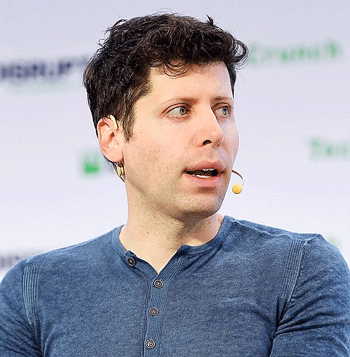What Sam Altman is about to face
What Sam Altman is about to face
The CEO of OpenAi is on a path that few have ever walked. He could end up as the most loved or the most hated person in the world. Or both.
By Jeffrey Cole
Sam Altman better get ready. He is about to get very rich and, more importantly, very famous.
There is nothing that could ever prepare him for what is about to happen.
Altman is one of the initial investors and now CEO of the most talked-about company on Earth: Open AI, a leader in artificial intelligence and creator of ChatGPT. Already the recipient of multi-billion-dollar investments (including $10 billion from Microsoft, which also integrated ChatGPT into Bing and its Office suite), Open AI has burst into the public consciousness faster than any other company in history. In a few short months, it grew to 100 million users.
That’s just the beginning.
AI has been talked about in laboratories and science fiction for generations. Skeptics have argued that artificial intelligence has a great potential… and always will. Those days are over. It is here. We are about to discover its potential. For better or worse. Probably both.
You can arbitrarily choose among a mass of predictions about AI:
- It will free us from mundane, repetitive tasks and make our lives infinitely more creative and fulfilling.
- It will level the playing field between those who grew up privileged with wealth and degrees from great universities and those middle class (or poorer) with high school or community college backgrounds and far less opportunity.
- It will eliminate tens of millions of jobs, not just among drivers and cashiers, but also among lawyers, doctors, and other highly-trained, highly-paid professionals.
- It will destroy education with no effective way to prevent cheating, copying, or plagiarism.
- It will make a mockery of copyright.
- Scariest of all, Artificial Intelligences will become sentient and make human choice and control obsolete.
Sam Altman is the face of all of this. He is on course to become the most hated person on Earth. He will likely become one of the richest people ever to have lived.
What a burden!
People in anything close to Altman’s position have not handled it well.
Until the digital age, the public didn’t know much about the leaders of the world’s most important companies. In the late nineteenth and early twentieth centuries, the names John Rockefeller, Andrew Carnegie, and Henry Ford were known. People could associate those names with companies or industries, but most knew little about them except their wealth. Most probably couldn’t recognize their faces. Despite their often-predatory business practices, their legacies probably best rest on the charitable foundations each created that remain prominent today.
That changed with the digital technology companies. The founders of what are now the biggest companies on Earth are known not just for their innovations and business practices, but also for their lifestyles, relationships, politics, and a lot more.
It is almost impossible today to create a global company that will change the world without a face and personality that people associate with it. The era of the faceless transformational company is over.
The CEO icons who came before
It started with Bill Gates and Steve Jobs.
Although Microsoft never achieved immense love from its customers (Windows Vista, the blue-screen-of-death, needless revisions of Office), the public was fascinated by Gates as the icon of the company. He quickly became best known for being the richest man in the world. The image of Microsoft was inseparable from Gates, who was never comfortable as a spokesman or public figure. Eventually he followed the model of Ford and Carnegie and left Microsoft to build his legacy not through operating systems, but philanthropy.
Steve Jobs was comfortable as the face of Apple and the best-known CEO on Earth. He was born for the role. Although Steve Wozniak was there at the beginning, within a few short years Apple was all Jobs. After he returned to Apple in 1997 (the company fired him in the 1980s), Jobs dominated the company for the rest of his life.
With must-see product launches of the iPod, iPhone, and iPad (clad in his signature jeans and black turtleneck sweater), Jobs was as famous on the cover of People Magazine and on Entertainment Tonight as he was in the Wall Street Journal or at investor conferences. Had his life not been tragically cut short at 56, Jobs would still be the at the center of everything and probably the best loved corporate leader of all time.
Altman is on course to become the most hated person on Earth. He will likely become one of the richest people ever to have lived. What a burden! People in anything close to Altman’s position have not handled it well.
Each of the next generation’s founders became the face and symbol of their companies. It was a required part of building the companies and their legends.
The public became fascinated with Jeff Bezos as he built Amazon into a lifeline (especially during COVID) and eclipsed Gates as the richest person on earth. Even when he stepped down as Amazon’s CEO, divorced his wife (making her one of the richest people in the world), and went on sabbatical living the world’s most public mid-life crisis, the world remained fascinated with him.
The same is true of Larry Page and Sergei Brin at Google. It was 25 years ago, while graduate students at Stanford, that they developed a new algorithm for search that led to Google, an indispensable part of all of our lives. Their story of building Google in a Silicon Valley Garage (like Hewlett and Packard in the 30s and Jobs and Wozniak in the 70s) is the stuff of legend. Now, as Google is threatened by Altman’s Open AI, Larry and Sergei are back in the spotlight returning to active involvement at Google to fend off the threat.
It’s a different story with Mark Zuckerberg and Facebook. Although the founding of the company is also the stuff of legend (and a pretty good movie: The Social Network), Zuckerberg’s path has been rockier. He achieved the fame and fortune of the others, but like Gates he was not comfortable as the face of the company and did not get much love. These days, Zuckerberg has become a lightning rod for everything that is wrong with social media and big tech. His fame is guaranteed, but the company, if it survives, might do better without him as its face.
And there are many lessons surrounding Elon Musk and Tesla. For the past 15 years, Musk seemed to be the Thomas Edison of the 21st century. Musk is now the most famous business leader since Steve Jobs.
Musk’s innovations (like Edison’s light bulbs, movie projectors, phonographs, and more) have transformed our lives. He built the first successful new automobile company in over 50 years. He brought new thinking to the payment world (PayPal), and he beat out governments and other billionaires to turn transportation to outer space into a business.
Musk became the most interesting person on the planet. Tesla reports that they attracted the best engineers and computer scientists from the best schools because they wanted to work around Musk. His every whim and thought commands international attention. He meets with global leaders. He was on a path to becoming one of the most famous and important people in history.
Like Jobs, Musk seemed to bask in being the face of Tesla and new tech. Then something went very wrong. I’ll leave it to others to unravel the psychology that seemed to change Musk. His quest for Twitter, which he quickly seemed to ruin, his embrace of tyrants and dictators and the far right, his disdain for his own workers, all signaled a change of tone.
Never has a reputation risen so quickly to the very pinnacle of the human race and never (within six months) has it fallen even more quickly. Now, some who idolized Musk for his embrace of electric cars and the environment will not buy a Tesla because he heads the company. Tesla now would probably be better without him.
This is what Sam Altman faces.
Of course, it is possible Altman will end up a footnote in history, but that seems unlikely. He can look to the examples of Steve Jobs or Elon Musk for guidance.
No one could be prepared for what he is about to experience. Will Altman be the face of the company that enhances or ruins our lives?
____________

Jeffrey Cole is the founder and director of The Center for the Digital Future at USC Annenberg.
See all columns from the center.
March 22, 2023


